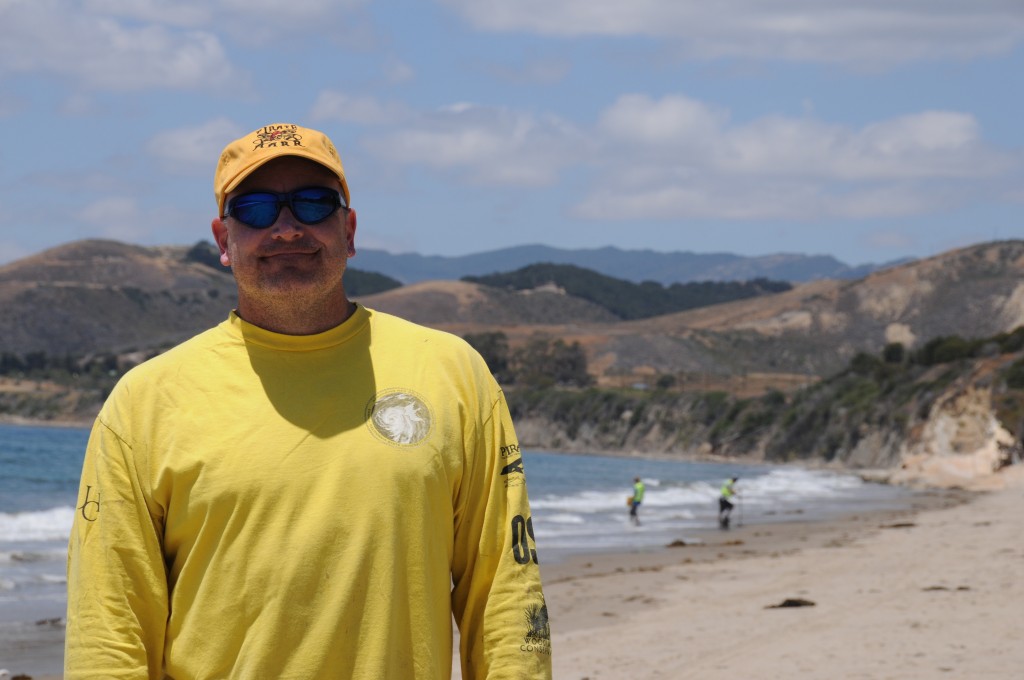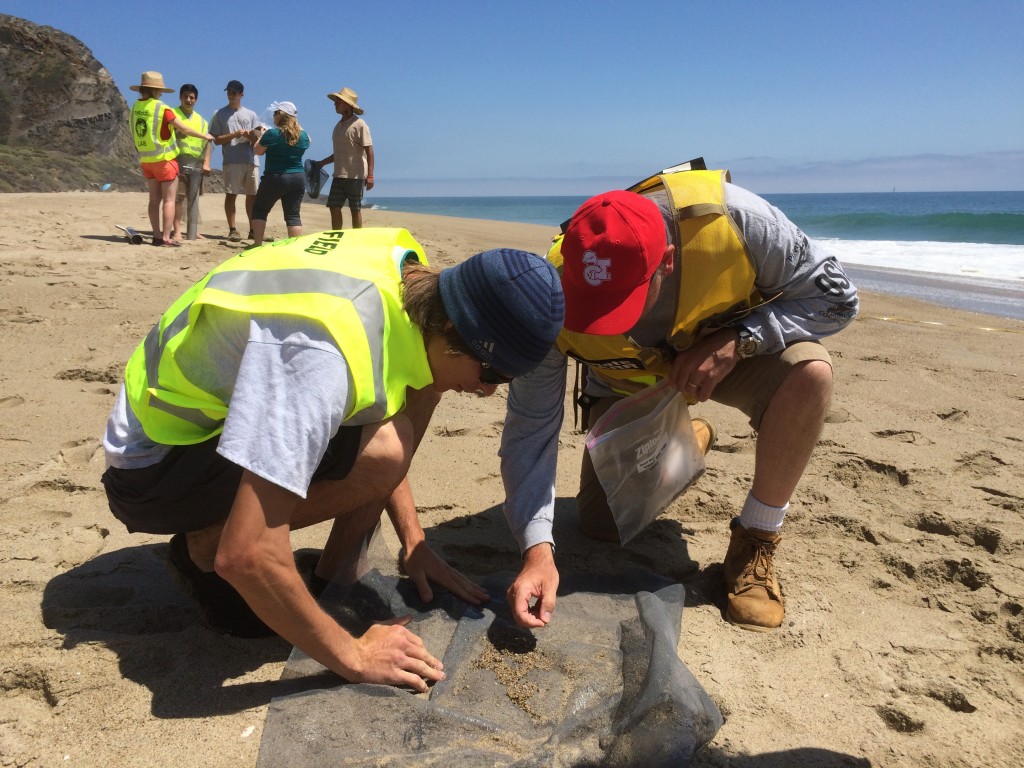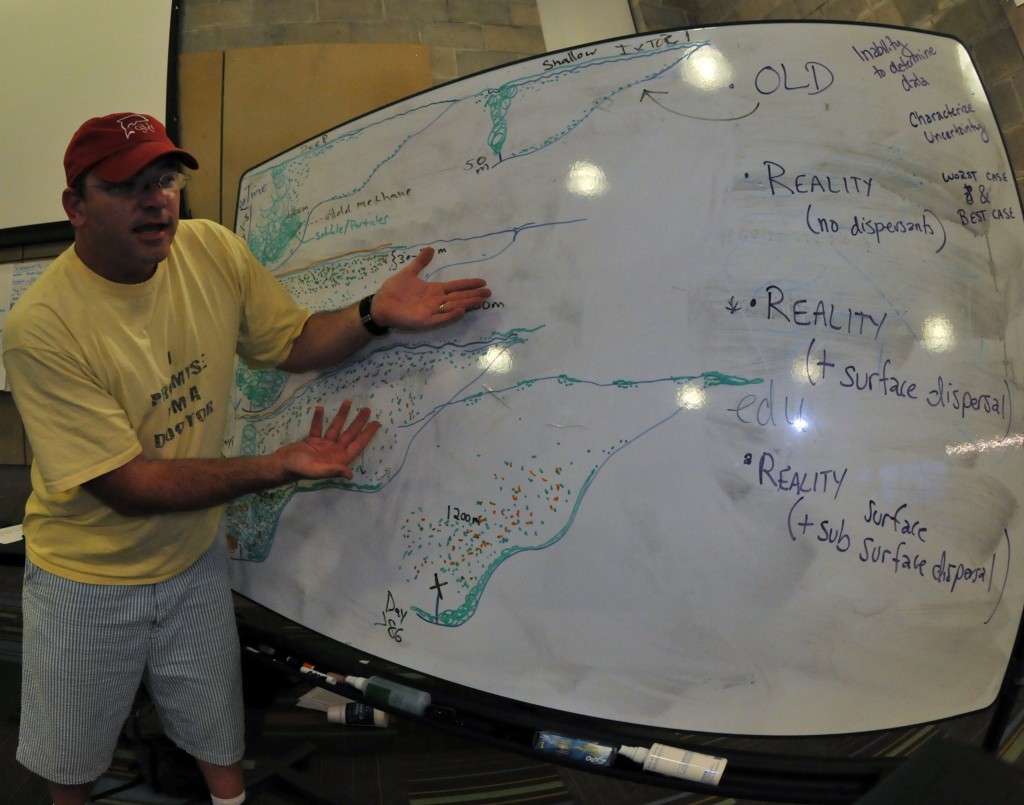
Dr. Anderson at El Capitan State Beach, CA on May 20, 2015. This was 18 hours after oil began spilling onto local beaches from the ruptured Plains All American Pipeline.
Dr. Sean Anderson
Professor of Environmental Science and Resource Management
California State University Channel Islands
sean.anderson@csuci.edu
c (805) 732-2732

Chase Tillman and Dr. Sean Anderson (red hat) sorting a sand core at Point Mugu State Beach on June 2, 2015.
Academic degrees:
- UC Santa Barbara: dual Bachelor’s in Ecology & Evolution and in Environmental Studies
- UC Los Angeles: Ph.D. in Marine Population Ecology
- Stanford University: Postdoctoral Fellow at the Center for Conservation Biology, Research Fellow
Oil Spill & Oil-Related Research locations (from most frequent to least frequent):
- California (focused on the Santa Barbara Channel & Southern California Bight)
- Northern Gulf of Mexico (mostly focused on Louisiana coastline)
- Turkey (mostly in eastern Anatolia)
- general interest in global oil production and oil spill impacts
Where I’ve Taught Courses, Run Working Groups, etc.:
- UC Santa Barbara
- UC Los Angeles
- Santa Rosa Island Field Station (CSU Channel Islands’ field station)
- Wrigley Marine Science Center (USC’s Field Station on Catalina Island, California)
- Hawai’i Institute of Marine Biology (University of Hawai’i’s Coconut Island Field Station)
- Stanford University (main campus and Hopkins Marine Station)
- Bodega Marine Lab (UC Davis’ Field Station in Bodega Bay)
- Elkhorn Slough National Estuary Research Reserve (Monterey Bay)
- Ballona Wetlands, Los Angeles, California
- Woodlands Conservancy, Belle Chasse, Louisiana
- Tulane University, Louisiana
- Dauphin Island Marine Station, Alabama
- Cook Islands (Aitutaki and Rarotonga)
Short biographic sketch:
Dr. Sean Anderson is a broadly trained ecologist who has tackled environmental questions from Alaska to the South Pole. Sean joined the then three-year old California State University Channel Islands in 2005, creating both his PIRatE Lab and a unique coastal restoration curriculum. His novel approach to teaching emphasizes community service and includes signature courses wherein students travel to distant communities such as New Orleans, Louisiana and Aitutaki Atoll in the Cook Islands to assess coastal systems. His annual class to New Orleans, Louisiana pushes undergraduates to examine drivers of wetland loss and policy failures, conduct post-Hurricane Katrina (and post-Deepwater Horizon) environmental impact assessments, rebuild homes, install community food gardens, and embed themselves within local communities and cultures. Sean’s energetic and innovative teaching efforts have garnered several local and national awards and spawned the eponymous “Sean Anderson” character (played by Josh Hutcherson) in Warner Brother’s Journey film franchise.
Sean’s research centers around restoring degraded ecosystems and improving the management of the coastal zone. His large-scale ecological restoration projects across California, Louisiana, and eastern Turkey usually focus on wetland, riparian, or coastal strand systems. His coastal zone management work includes quantifying the effects of roads on mobile animals in southern California (now using a citizen science iPhone app), evaluating the sustainability of seafood options available for purchase in California, assessing the efficacy of Marine Protected Areas with Remotely Operated Vehicles (ROVs), longitudinal research into opinions and understanding of coastal management, monitoring coastal health with of aerial robotic sensor platforms, cultivating and recovering endangered plants, developing the first rapid assessment protocols to measure the health of sandy beaches, and assessing the impact of pollutants on marine and estuarine systems. He created and now co-leads the NCEAS National Working Group on the Ecotoxicology of Gulf Oil Spill, the only independent national body investigating the long-term ecological consequences of the largest marine oil spill in history. Sean is an elected or appointed member of several working groups, boards, joint power authorities, and Scientific Advisory Panels.

